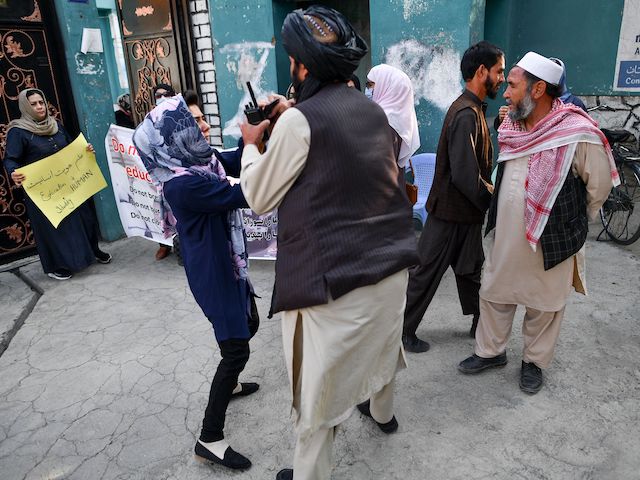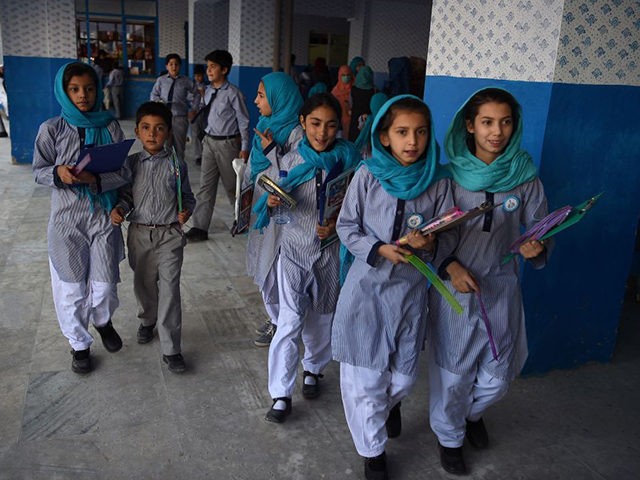The Taliban jihadist organization celebrated the beginning of the school year in Afghanistan on Wednesday – which it had promised would begin for both boys and girls – but blocked girls over sixth grade from entering classrooms.
The abrupt ban on girls’ education caused dramatic scenes outside of high schools in Kabul, where girls interviewed by local media tearfully described being excited for the return of normalcy following the demise of the U.S.-backed government in August only to be told they were not welcome in school.
The Taliban – a terrorist group whose rule from 1996 to 2001 was defined by brutal human rights abuses, particularly against women and girls – returned to power in August after President Joe Biden announced an extension of the 20-year-old Afghan war through the summer. Under President Donald Trump, the American government had agreed to leave Afghanistan by May 1, 2021, in exchange for Taliban leaders agreeing to cut ties with jihadist groups like al-Qaeda and not attacking U.S. and international forces. Biden broke the agreement, announcing American troops would stay in the country through September, prompting the Taliban to launch a nationwide campaign of conquest that ended on August 15, when Taliban fighters reached Kabul and former President Ashraf Ghani abruptly fled the country.
While no state has officially recognized the Taliban as the government of Afghanistan, governments of neighboring countries like Pakistan, China, and Russia have called for helping fund the Taliban through “humanitarian aid” to prevent a civilian catastrophe in the country. The United Nations also voted for cooperation with “relevant Afghan political actors” – without naming the Taliban, whose authority no other relevant Afghan political actors contest – last week, essentially greenlighting working with the Taliban.
The Taliban “Ministry of Education” opened the school year on Wednesday with a ceremony in which various leaders addressed a crowd of men on the value of knowledge.
According to the Taliban’s Bakhtar News Agency, the event to usher in the school year featured remarks from senior Taliban official Mawlawi Noorul Haq celebrating the “value of science and knowledge.” Haq asserted, however, that Afghanistan’s education system, while valuing science and knowledge, “must be standardized and in line with Islamic and Afghan values.” Taliban leaders have repeatedly insisted that any inclusion of women in society and expansion of education must adhere to its extremist interpretation of sharia, or Islamic law.
Another official, Education Ministry spokesman Aziz Ahmad Reyan, had the dubious distinction of announcing that girls above sixth grade would not be allowed in schools “until further notice,” according to Bakhtar. Rayan reportedly stated that the Taliban had, as it had previously stated, intended to allow all boys and girls to return to school, but needed more time to adjust girls’ education.
“Once a comprehensive plan has been drawn up in this regard – in accordance with sharia and Afghan tradition and culture, and the leadership of the Islamic Emirate [the Taliban] has been ordered – then these girls’ schools and high schools will be officially informed,” Rayan said of girls’ middle and high schools, according to the Taliban news outlet.
As recently as January, Taliban officials had claimed that girls would return to school alongside boys. Spokesman Zabihullah Mujahid said at the time that girls would all return to school by March, blaming logistics issues – not fundamentalist opposition – for Afghan girls’ inability to return to school.
“We are not against education,” Mujahid told reporters at a press event at the beginning of the year, according to Al Jazeera. “In many provinces, the higher classes (girls’ school) are open, but in some places where it is closed, the reasons are economic crisis and the framework, which we need to work on in areas which are overcrowded. And for that we need to establish the new procedure.”
Afghanistan’s Tolo News noted on Wednesday, following the announcement, that the Ministry of Education had explicitly promised that girls’ education would resume this week. It noted that older girls were allowed to return to school in only two provinces, Herat and Badghis, and reported dramatic scenes of crying schoolgirls throughout Kabul.
The Taliban breaking its promise to allow girls their right to education undermines months of international institutions expressing faith that the jihadist organization would not resume the brutality it implemented in the country in the 1990s. Shortly after the demise of the prior Afghan government in August, the United Nations children organization UNICEF claimed the Taliban supported girls’ education.
UNICEF’s head of Afghan field operations, Mustapha Ben Messaoud, said that month that the group had “not had a single issue with the Taliban” and that, based on “ongoing discussions,” the U.N. entity was “quite optimistic” that the Taliban would allow girls to go to school.
Western diplomats similarly issued a collective statement in January expressing hope that “the revival of Afghanistan’s economy” would lead to expanded rights for women and girls. In a statement urging more international aid for the country, the group of diplomats “noted with grave concern the absence from, and limitations on access to, secondary schools for girls in many parts of the country and underscored the importance of higher education for women as well as job opportunities for women in all fields.”

A woman protester scuffles with a member of the Taliban during a demonstration outside a school in Kabul on September 30, 2021. (Bulent Kilic/AFP via Getty Images)
Taliban leaders repeatedly promised an “inclusive” government with women allowed to participate in society.
“Our sisters … have the same rights, will be able to benefit from their rights,” Mujahid, the top Taliban spokesman, said during his first press conference after the takeover of Kabul in August. “They can have activities in different sectors and different areas on the basis of our rules and regulations, educational, health, and other areas.”
“There is not going to be any discrimination against women,” he asserted, “but of course within the frameworks that we have.”
Mujahid then subsequently announced the Taliban had ordered all women and girls in Afghanistan to not leave their homes until further notice, to allow the Taliban time to teach its terrorists “how to deal with women.”

COMMENTS
Please let us know if you're having issues with commenting.